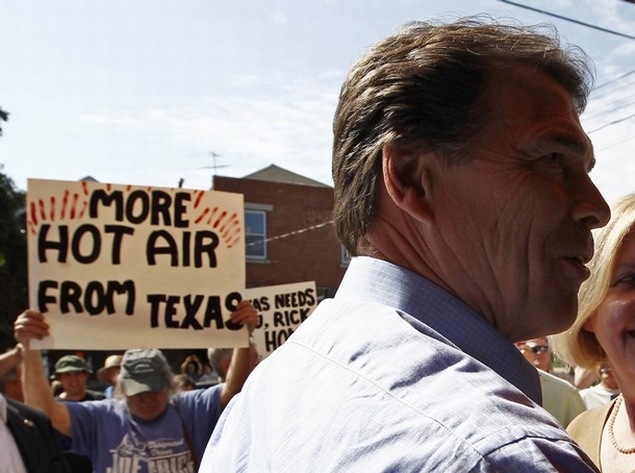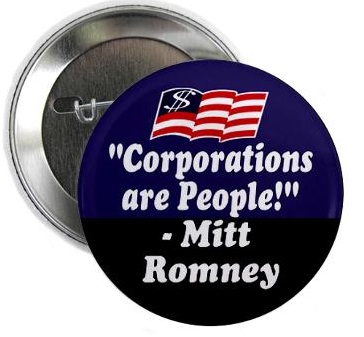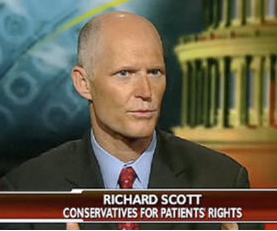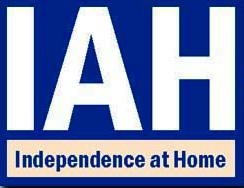Through the Toxic Mirror: Vietnamese and Americans Continue to Suffer Effects of Agent Orange
Fred Wilcox is a writing professor at Ithaca College and a long-time peace activist.

Fred Wilcox is a writing professor at Ithaca College and a long-time peace activist.
In his quest to win the Republican presidential nomination, Texas Gov. Rick Perry is perpetuating a convincing hoax: that implementing Texas-style tort reform would go a long way toward curing what ails the U.S. health care system.
 Like his fellow GOP contenders, Perry consistently denounces "Obamacare" as "a budget-busting, government takeover of healthcare" and "the greatest intrusion on individual freedom in a generation." He promises to repeal the law if elected.
Like his fellow GOP contenders, Perry consistently denounces "Obamacare" as "a budget-busting, government takeover of healthcare" and "the greatest intrusion on individual freedom in a generation." He promises to repeal the law if elected.
A few months before I left my job in the insurance industry in 2008, I was working on a "white paper" to try to persuade people -- especially lawmakers and candidates running for office that year -- that the problem of the uninsured in this country was not a big deal.
 Across the country on September 1, nurses will converge on local congressional offices to demand a tax on Wall Street financial speculation, a move they say is a step towards healing the nation, trimming the deficit, and preserving social programs.
Across the country on September 1, nurses will converge on local congressional offices to demand a tax on Wall Street financial speculation, a move they say is a step towards healing the nation, trimming the deficit, and preserving social programs.
National Nurses United (NNU) is planning a day of action in over 60 congressional offices in 21 states. In Wisconsin, the group is sponsoring a soup kitchen outside of Rep. Paul Ryan's Janesville office "to provide residents with the sustenance they are not getting from Paul Ryan," says NNU spokesman Charles Idelson.
A couple of years ago, when Sen. Jay Rockefeller of West Virginia asked me to testify about little-known health insurance industry practices at a hearing of his Senate Commerce Committee, I initially was reluctant. I knew that if I was completely honest, my life would change forever.
What he was asking me to do was to disclose practices that have contributed to the growing number of Americans without insurance, the even faster growing number of us who are underinsured, and the phenomenal increase in insurance industry profits over the years, even as the ranks of those without coverage swelled.
If NBC's David Gregory had asked just a couple of follow-up questions of Michele Bachmann on Meet the Press on Sunday, August 14, he would have found that her anecdote about how "Obamacare" will lead to economic ruin doesn't stand up to scrutiny.
While on the campaign trail in Iowa, former corporate executive and Republican governor of Massachusetts Mitt Romney shot back at hecklers who were challenging his stance that it would be unfair and unwise to raise taxes on wealthy individuals and corporations to reduce the deficit.
 "Corporations are people, my friend," Romney said. "Everything corporations earn ultimately goes to the people. Where do you think it goes? Whose pockets? People's pockets! Human beings, my friend."
"Corporations are people, my friend," Romney said. "Everything corporations earn ultimately goes to the people. Where do you think it goes? Whose pockets? People's pockets! Human beings, my friend."
Democrats were quick to pounce.
 As he was gearing up to run for governor of Florida, Republican Rick Scott emerged as one of the most vocal opponents of what he and others began referring to as "Obamacare."
As he was gearing up to run for governor of Florida, Republican Rick Scott emerged as one of the most vocal opponents of what he and others began referring to as "Obamacare."
Scott created, chaired and bankrolled a group called Conservatives for Patients Rights that spent millions of dollars on TV commercials attacking health care reform, especially a proposal calling for the federal government to create a public health insurance option to compete with private insurers.
In one ad, the narrator said the votes of a few key senators could determine whether or not Americans would be able to keep their own doctors and their own health insurance plans. The implication was clear -- people would lose the ability to choose their own doctors if health reform passed.
Trouble was, it wasn't true.
Submitted by Anne Landman on
 American Legislative Exchange Council corporate member Diageo, PLC, which owns Smirnoff, Ketel One, Captain Morgan, Cuervo, Crown Royal, Johnnie Walker and other hard liquore brands, will ramp up its spending on TV ads targeting Hispanics by 3,000 percent to convince them to drink more hard liquor instead of beer. In the past, hard liquor ads on Hispanic TV have been rare. Diageo spent $147.7 million on advertising last year, none of which was spent on Spanish-language network TV. But now Diageo has announced it will start pouring money into ads on the Univision network, which owns 36 Spanish-language TV stations covering 60 percent of the country. Diageo is basing its new Hispanic targeting on U.S. Census data that showed a 43 percent increase in the Hispanic population over the past decade, and statistics showing Hispanics tend to buy more beer than hard liquor compared to other groups.
American Legislative Exchange Council corporate member Diageo, PLC, which owns Smirnoff, Ketel One, Captain Morgan, Cuervo, Crown Royal, Johnnie Walker and other hard liquore brands, will ramp up its spending on TV ads targeting Hispanics by 3,000 percent to convince them to drink more hard liquor instead of beer. In the past, hard liquor ads on Hispanic TV have been rare. Diageo spent $147.7 million on advertising last year, none of which was spent on Spanish-language network TV. But now Diageo has announced it will start pouring money into ads on the Univision network, which owns 36 Spanish-language TV stations covering 60 percent of the country. Diageo is basing its new Hispanic targeting on U.S. Census data that showed a 43 percent increase in the Hispanic population over the past decade, and statistics showing Hispanics tend to buy more beer than hard liquor compared to other groups.
Dr. Bruce Kinosian still makes house calls, and he's proud of it. In fact, he introduces himself as a physician who goes to see his patients in their homes rather than insisting that they come to see him at his office.
 He's convinced that if more doctors did what he does, we could eliminate billions of dollars we currently spend in this country in an often-futile -- and almost always incredibly expensive -- effort to get people well.
He's convinced that if more doctors did what he does, we could eliminate billions of dollars we currently spend in this country in an often-futile -- and almost always incredibly expensive -- effort to get people well.
Much of that savings, he says, would accrue to the Medicare program, making it unnecessary for Congress to even consider eliminating benefits or raising the eligibility age.
Kinosian, associate professor of medicine at the Hospital of the University of Pennsylvania in Philadelphia, is a leading advocate of the Independence at Home (IAH) program, which quietly has been saving the Department of Veteran's Affairs (and taxpayers) lots of money -- and improving the quality of life for thousands of veterans -- for nearly three decades.
Center for Media and Democracy (CMD)
520 University Ave, Ste 305 • Madison, WI 53703 • (608) 260-9713
CMD is a 501(c)(3) tax-exempt non-profit.
© 1993-2025